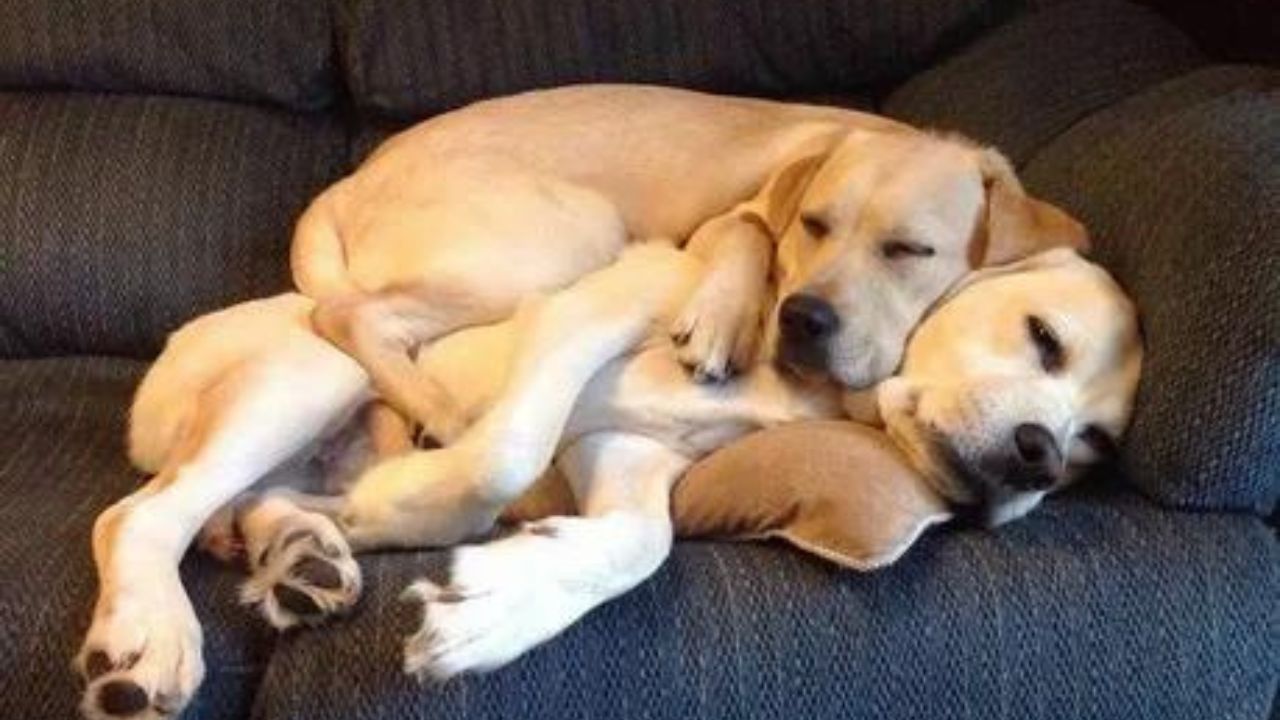Bringing home a new puppy is an exciting and rewarding experience. As a responsible pet owner, ensuring your furry friend gets enough sleep for their overall health and well-being is essential.
But how often should your puppy sleep? In this article, we’ll explore the recommended sleep patterns for puppies and provide some tips on establishing a healthy sleep routine.
Something to remember about puppies is that they need sleep – lots of it, just like babies. Your puppy will need about 18-19 hours of sleep every 24. So, only expect 4 to 5 hours of being awake and only about an hour at a time.
If they’re kept awake and playing, you could be heading for a stressful time.
The Importance of Sleep for Puppies

Just like human babies, puppies require plenty of sleep to support their growth and development. During sleep, their bodies undergo crucial processes, such as cell regeneration, hormone regulation, and brain development.
Sufficient sleep also plays a vital role in strengthening their immune system and promoting overall physical and mental health.
Over-Tired and over-Excitable
Just like excitable toddlers, puppies are learning, and just as a lack of sleep affects a child’s behaviour, your puppy will be badly behaved if he doesn’t get enough sleep. If a puppy is overtired, he will not learn as well as he could.
This will affect his ability to make correct choices – for example, chasing excited children, jumping up and mouthing. The behaviour will only worsen in an over-tired puppy, which takes time to unlearn.
Taking a 14-week-old puppy for lots of really long walks and keeping them awake all day to ‘tire them out’ is having the opposite effect for the following reasons:
What happens if a young puppy (under five months old) has too much play and exercise but not enough sleep? His body will produce adrenalin to cope with the demands and stresses, which means the dog can’t then settle down when at home.
If adrenalin builds up over several days, the stress hormones take much longer to get rid of, and you end up with a frantic puppy biting anything that moves. Neither the puppy nor your family will be able to relax.
Sleep Requirements by Age
Puppies have varying sleep requirements depending on their age. Here’s a breakdown of the recommended sleep duration for different stages of development:
Newborns (0-2 Weeks Old)
Newborn puppies typically spend most of their time sleeping. They need around 90% of their day for rest. A newborn puppy can sleep up to 22 hours daily, waking up only briefly to nurse from their mother. It’s important to create a warm and comfortable sleeping area for them, resembling the cosy environment of their litter.
Three to Eight Weeks Old
As puppies age three weeks, they gradually become more active and independent. They begin exploring their surroundings and engaging in playtime with their littermates. However, they still require a significant amount of sleep. During this stage, puppies need around 15-20 hours of sleep daily. A safe and quiet sleeping space will help them get the rest they need.
Eight to Twelve Weeks Old
Puppies experience a growth spurt and increased energy levels between eight to twelve weeks old. They are likely to be more playful and curious during their waking hours. However, they still need ample rest to support their rapid growth. During this stage, puppies should sleep approximately 14-18 hours daily.
Three to Six Months Old
As puppies approach the three to six-month mark, their sleep needs gradually decrease. They require around 13-16 hours of sleep each day at this stage. Puppies may start to show signs of increased independence and may be less reliant on constant napping.
Six Months and Older
When puppies reach six months, their sleep patterns resemble those of adult dogs. Most puppies will sleep for around 12-14 hours per day, with some variations depending on their individual needs and activity levels. A comfortable sleeping area and establishing a consistent routine will help them get sufficient rest.
Creating a Healthy Sleep Routine
Establishing a healthy sleep routine for your puppy is crucial for their well-being. Here are some tips to help you create a conducive environment for your furry friend’s rest:
Comfortable Sleeping Area: Provide your puppy with a cosy and quiet sleeping space. Use a soft bed or crate lined with blankets or a comfortable mattress to ensure they feel secure and relaxed.
Consistent Schedule: Establish a regular sleep schedule by setting specific times for bedtime and waking up. Consistency will help your puppy adjust to a routine and know when to rest.
Bedtime Rituals: Incorporate calming bedtime rituals to signal your puppy that it’s time to sleep. This could include a short walk, gentle massage, or quiet playtime before settling down for the night.
Avoid Disturbances: Minimize disturbances during your puppy’s sleep by keeping their sleeping area in a quiet and peaceful part of your home. Limit exposure to loud noises or bright lights that may disrupt their rest.
Physical Activity: Ensure your puppy gets enough exercise during their waking hours. Regular play sessions and walks will help them burn off excess energy, making it easier to relax and sleep.
Avoid Excessive Napping: While puppies need adequate sleep, avoid allowing them to nap excessively during the day. If they sleep enough during daylight hours, they may need help to sleep through the night.
Every puppy is unique, and their sleep needs may vary slightly. Observing your puppy’s behaviour and adjusting their sleep routine is essential. If you have any concerns about your puppy’s sleep patterns, it’s always a good idea to consult a veterinarian for professional guidance.
Waking Up at Night
Many new puppy owners experience the challenge of their furry friend waking up and demanding attention during the night. It’s important to remember that puppies have small bladders and limited bladder control, especially in the early stages of their lives. This means they may need to go outside to relieve themselves at night. To address this issue:
Establish a bathroom routine: Take your puppy outside for a bathroom break before bedtime and again at night if needed. This will help reduce accidents and encourage them to sleep through the night.
Limit access to water: In the hours leading up to bedtime, gradually reduce your puppy’s access to water. However, ensure they still have enough hydration throughout the day. By managing their water intake, you can minimize the need for nighttime bathroom breaks.
Ignore attention-seeking behaviour: If your puppy wakes up and starts whining or barking, avoid immediately responding to their demands. Ignoring attention-seeking behaviour will discourage them from associating waking up at night with receiving immediate attention.
Tips to Help Your Puppy Sleep During the Day
Leave your puppy alone when they’re sleeping. It is hard to resist cuddling your dog and letting them fall asleep in your lap, but you don’t want them to be dependent on you to fall asleep. Keep an eye on your dog because they’ll need to be taken outside when they wake up.
It’s also important to show your puppy where to sleep. If your pet seems tired, encourage them to nap in a safe place, such as a crate, a dog bed, or a quiet place where they can nap undisturbed. It may take time for them to get the idea, but eventually, they’ll recognize that spot as the place to sleep.
Tips to Help Your Puppy Sleep at Night
Make their crate an appealing place to be. Please don’t buy an expensive dog bed for a new pup because they’ll likely chew it up. Line the bottom of the crate with a soft, felted, inexpensive blanket or two. Beware of wool blankets or mats that can be chewed apart into long strings that cause choking.
Bring home a soft toy or baby blanket that smells like the pup’s mom, and keep that in the crate. Many owners place the puppy’s crate in their bedroom so they can feel that their family is close by.
Establish a bedtime routine. By giving the puppy a routine right from the start, you’ll teach them that nighttime is for sleeping, and you both will get a better night’s sleep. Restrict the pup’s food and water intake for several hours before bedtime. Play, cuddle, and take them outside to potty before bedtime.
Keep their sleep area quiet and dim. If you watch TV in bed, keep the volume and the light low. Use blackout shades if the room gets early morning light.
The quiet and dark will be the puppy’s cue that it’s time for sleep. If your crate is made of wire, you can put a crate cover over it to make it darker and more den-like.
Napping During the Day
Puppies require plenty of sleep during the day, but excessive napping can disrupt their nighttime sleep routine. Here are a few tips to manage your puppy’s daytime napping:
Establish playtime and exercise: Engage your puppy in regular play sessions and ensure they receive adequate physical activity. Keeping them mentally and physically stimulated during the day will help reduce the need for excessive napping.
Create a designated nap area: Provide your puppy with a specific area where they can nap during the day, separate from their nighttime sleeping space. This will help them associate different areas with different levels of rest.
Limit exposure to stimuli: During nap times, reduce exposure to loud noises, bright lights, and excessive stimulation. This will create a calm environment that promotes uninterrupted sleep.
Sleep Changes as Your Puppy Grows

It’s important to note that your puppy’s sleep patterns may change as they grow older. They will gradually require fewer hours of sleep and become more active during their waking hours. It’s crucial to adapt their sleep routine accordingly. Here are a few tips for managing sleep changes:
Gradual adjustments: As your puppy gets older, gradually adjust their sleep routine by reducing the number of naps and extending their waking hours. This will help them transition smoothly into their adult sleep patterns.
Observe their behaviour: Pay attention to your puppy’s behaviour and energy levels during the day. If they seem excessively tired or restless, they may need more rest. On the other hand, if they have difficulty falling asleep at night, they might get too much sleep during the day.
Consult a veterinarian: If you have concerns about your puppy’s sleep patterns or notice any unusual behaviours, consult a veterinarian. They can provide professional guidance and address any underlying health issues affecting your puppy’s sleep.
Conclusion
Adequate sleep is crucial for a puppy’s growth, development, and overall well-being. By understanding the sleep requirements at different stages of their life and implementing a healthy sleep routine, you can ensure your furry friend gets the rest they need. Remember to provide a comfortable sleeping area, establish a consistent schedule, and incorporate calming bedtime rituals. With proper sleep, your puppy will thrive and be ready for all the adventures that await them.
FAQ
How Much Sleep Do Puppies Need a Day?
The average hours of sleep puppies need each day is 16 to 18 — or even more. That’s right—dogs, especially puppies, sleep away most of their lives. In general, the younger the pup, the more sleep they need. (Can you believe newborn puppies spend 90% of their days sleeping?)
What is a Puppy’s Sleep Schedule?
Implying that the sleeping schedule is also affected by the dog’s breed. Generally, a puppy’s sleep schedule would range from 14-20 hours. During this period, a pup’s sleep schedule should never be disturbed. Here is a list of a puppy’s sleep schedules at various ages that you need to know.
Do Dogs Sleep More at Night than Puppies?
Adult dogs sleep for less time than puppies, but more of it is at night. By the time they are a year old, your pup will likely nap less during the day. However, the average amount of daytime sleep reported by owners is still 3 hours.
When Should a Puppy Go to Bed?
Going to bed one hour after meals and an evening potty walk is advisable. Specific times don’t matter; you must build a schedule to suit you. Although tiny puppies can’t sleep as long as

